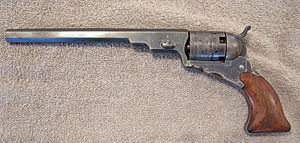Colt Paterson
| Colt Paterson | |
|---|---|

Colt Holster Model Paterson Revolver No. 5
|
|
| Type | Revolver |
| Place of origin | United States of America |
| Service history | |
| In service | 1836–1847 |
| Used by |
United States Republic of Texas |
| Wars |
Seminole Wars Texas–Indian Wars Mexican–American War |
| Production history | |
| Designer | Samuel Colt |
| Designed | 1836 |
| Manufacturer | Patent Arms Company, Paterson, New Jersey |
| Produced | c. 1836–1842 |
| No. built | about 2,800 |
| Variants | different calibers, sizes and configurations |
| Specifications | |
| Weight | 2 lb 12 oz (1.2 kg levered model) |
| Length | 13.75 in (34.9 cm) (Texas Model) |
| Barrel length | 7.5 in (19 cm) |
|
|
|
| Caliber | .36–.380-inch ball, revolver |
| Action | single-action |
| Muzzle velocity | 900 ft/s (270 m/s) |
| Effective firing range | 65 yd (59 m) |
| Feed system | five-round cylinder |
| Sights | blade front sight, hammer notch rear sight |
The Colt Paterson is a revolver. It was the first commercial repeating firearm employing a revolving cylinder with multiple chambers aligned with a single, stationary barrel. Its design was patented by Samuel Colt on February 25, 1836, in the United States, France, and England, and it derived its name from being produced in Paterson, New Jersey. Initially this 5-shot revolver was produced in .28 caliber, with a .36 caliber model following a year later. As originally designed and produced, no loading lever was included with the revolver; a user had to disassemble the revolver partially to re-load it. Starting in 1839, however, a reloading lever and a capping window were incorporated into the design, allowing reloading without requiring partial disassembly of the revolver. This loading lever and capping window design change was also incorporated after the fact into most Colt Paterson revolvers that had been produced from 1836 until 1839. Unlike later revolvers, a folding trigger was incorporated into the Colt Paterson. The trigger only became visible upon cocking the hammer.
A subsequent patent renewal in 1849, and aggressive litigation against infringements, gave Colt a domestic monopoly on revolver development until the middle 1850s.
Early Colt literature and later publications insist that Colt was inspired to design the revolver in 1830 by viewing the steering mechanisms aboard the brig Corvo while bound from Boston to Calcutta. However, some believe he saw examples of the Collier Flintlock Revolver while touring the Tower after the Corvo docked on the River Thames. In any event, sometime while aboard the Corvo he produced a wooden model (the model is exhibited at the Wadsworth Atheneum, Hartford, Connecticut) and further developed the concept during the early 1830s.
...
Wikipedia
